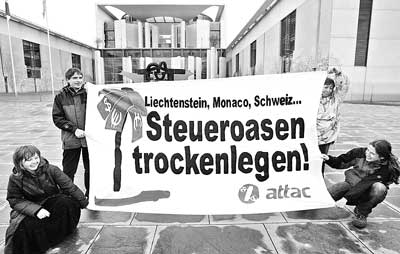
Liechtenstein dirty money shows the West is also corrupt
NEW YORK - As anecdotes go, it's the story of an African prime minister who walks into one of the leading Swiss banks for an appointment with the chief executive officer (CEO). The bank, based in Geneva, was known primarily for its highly secretive numbered accounts and the privacy of its clients, including some of the world's most corrupt political leaders. As he starts his one-on-one closed-door discussion with the CEO, the African says he is aware that the president of his country was funnelling his ill-gotten gains into a numbered account in the bank. And then suddenly, the prime minister pulls out a gun, holds it to the head of the bank executive and threatens to shoot him, if he does not reveal details of the secret bank account. The bank executive, ever faithful to the ethics of his financial institution, apparently responds by saying he will not, under any circumstances, breach the rules of the bank by opening up a client's bank account for outside scrutiny. "Even if you shoot me, I will not give you that information," he adds. Or so the story goes. Elated with the response, the prime minister turns to the bank official and says: "Now that I am sure you will not betray your clients, I want to open an account in your bank," he tells the trembling but relieved CEO. But last week there were stories that the ethics of the banking profession, contrary to time-honoured traditions, were up for sale in another country: the principality of Liechtenstein. A UN member state geographically sandwiched between Austria and Switzerland, Liechtenstein is home to thousands of numbered accounts belonging to individuals who were avoiding taxes in their own home countries or laundering their dirty money. The irony of it is that the German intelligence services, trying to crack down on corrupt practices of its own citizens, resorted to a corrupt practice themselves in order to track down the culprits. An informant working for the LGT Group, a bank in Liechtenstein, was apparently paid about five million euros (about $7.0 million) for confidential banking data of more than 800 clients. At the same time, British tax authorities also reportedly bribed the same informant to get banking data on British citizens who sheltered their money in Liechtenstein. At least about 100 UK nationals are currently under scrutiny. In Germany alone, the tax authorities have recovered or imposed fines amounting to more than $41 million from German nationals with secret bank accounts. "At the moment, this sum is rising daily," one of the German prosecutors, was quoted as saying last week. "We have already been notified of more voluntary payments." The ongoing investigation has also spread to about eight countries, including UK, Spain, Greece, Italy, Ireland, the Czech Republic, Finland and the United States, where nationals have figured on the list of clients hiding money in bank vaults. Or so they thought. The focus is also shifting to other tax havens in Europe, including Andorra and Monaco, whose banks hold more than 300,000 accounts running into over $100 billion. The US Internal Revenue Service rarely pays for information upfront. But any informant can later claim a percentage of the money collected based on the data he or she provided. The Paris-based Organisation for Economic Cooperation and Development (OECD) has already described Liechtenstein, Andorra and Monaco as "uncooperative tax havens." At the United Nations, the Western world always takes a "holier-than-thou" attitude in routinely pointing the accusing finger at developing nations for rampant bribery, corruption, tax fraud and money laundering. The widely circulated, Western-inspired stories about the late Mobutu Sese Seko, president of the former Zaire, have been stuff of urban legends. Described as one of the world's most corrupt leaders, who was mollycoddled by Western nations with their own hidden political agendas, Mobutu was brazen about his crooked ways. At a press conference, Mobutu was once asked whether it was true he was the second wealthiest political leader in the world. A seemingly outraged Mobutu shouted back at the reporter: "It's a lie. It's a lie,' and then added with a straight face, "I am only the third richest." While no one rightly condones bribery and corruption -- whether it is practised in developed or developing countries -- at least the focus has now shifted to countries that traditionally preach morality and ethics to others. Since it takes two to do the political tango, Mobutu's corrupt practices were facilitated by contractors and arms merchants in Western nations. While the bribe takers were politically crucified, the bribe givers have mostly got away unscathed. In reality, both should be held accountable. When the United Nations approved its Convention Against Corruption, then Foreign Minister Lakshman Kadirgamar, was his eloquent self when he said: "Those individuals who wallow in corruption should be drummed out of politics. Let us be partners in that campaign. The business community will no doubt bear in mind that it takes two to make a corrupt transaction. Be not one of them." |
|
||||||
|| Front
Page | News | Editorial | Columns | Sports | Plus | Financial
Times | International | Mirror | TV
Times | Funday
Times || |
| |
Reproduction of articles permitted when used without any alterations to contents and a link to the source page.
|
© Copyright
2008 | Wijeya
Newspapers Ltd.Colombo. Sri Lanka. All Rights Reserved. |
